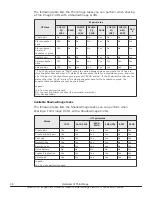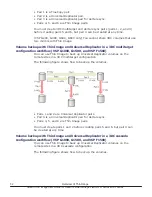
Thin Image pair restoration
You can use Thin Image to overwrite snapshot data in pools to P-VOLs so that
the P-VOL content is returned to the condition it was when you stored
snapshot data.
Overwriting snapshot data to P-VOLs is also referred to as restoring Thin
Image pairs.
If data is written to a secondary volume, this particular data (not snapshot
data) is overwritten to the primary volume when the Thin Image pair is
restored.
If a problem occurs in P-VOL data due to a failure, restoring the pair restores
the P-VOL data saved when the snapshot data was stored.
The time for restoring a Thin Image pair depends on the following, even if the
pair synchronization rate is 100%:
• The amount of pool capacity a pair is using.
• The number of pairs being operated concurrently.
The pair synchronization rate shows the rate that S-VOL data matches that of
the next generation of the S-VOL. If the S-VOL is the latest one, the
synchronization rate is computed by comparing the S-VOL with the P-VOL.
For the Thin Image pair where the cascade attribute is enabled, the
information displayed in Synchronization Rate (%) of the View Pair
Synchronization Rate window varies depending on the pair status.
Related tasks
•
on page 141
How Thin Image pair status changes
The Thin Image pair status changes as you create, split, or perform other
pair tasks.
The following figure illustrates status changes to Thin Image and snapshot
pairs.
Overview of Thin Image
37
Hitachi Thin Image User Guide for Hitachi Virtual Storage Platform G Series and F Series






























